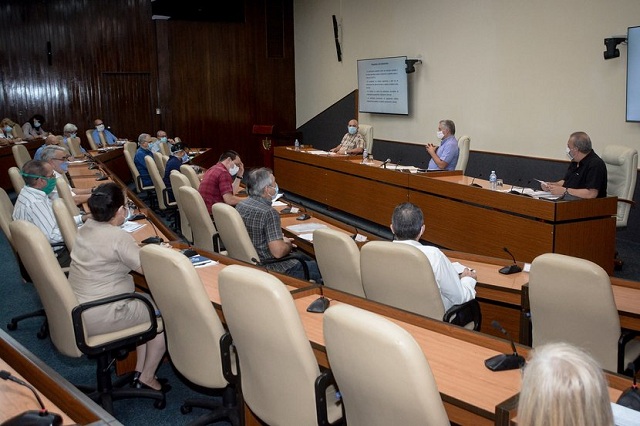Havana: A few hours before Havana entered the first phase of recovery and the rest of Cuba, with the exception of Matanzas, the second, the President of the Republic, Miguel Díaz-Canel Bermúdez, stressed that “science continues to confirm that in the confrontation with COVID-19 there can be no trust?, the Cuban Presidency publishes.
In another stimulating meeting at the Palace of the Revolution with scientists and experts – a fixed space on the government’s agenda every Thursday – the Head of State considered that ?based on scientific research, we are getting to know the virus better; They are also giving us elements of topics that we have to deal with in a different way; but they are corroborating the measures that we have applied and the issues that we have insisted on, such as physical distancing, social isolation and the use of the facemasks?.
Díaz-Canel commented that the theories that existed at a certain moment that nothing in the Caribbean would happen due to high temperatures were broken. We are even realizing how aggressive the virus is and the characteristics that distinguish it from others, for which it has caused the collapse in health systems around the world.
In the exchange with researchers from prestigious scientific centers in the nation -with the participation of the Prime Minister, Manuel Marrero Cruz- the president warned that now that we are in the recovery phase, discipline and control must be maintained.
The de-escalation, he stressed, has to be very rigorous, gradual, to avoid complications and, above all, to be sure that we have the capacity to detect disease outbreaks on time, work intensively so that they do not complicate us and do not become in larger events.
The President of the Republic reiterated that “the contribution of the health system and scientists continues to be confirmed.” As never before, he reflected, an event has given such a proliferation of research, publications and results that are putting Cuban science in a role of visibility in the world that is very interesting and exalting.
We have extrapolated this work system, he said, to the scientists who have to do with food production, which is the other great priority and challenge that we have to face, with the economic consequences that COVID-19 is leaving in the world. We hope to have the same success that we have had in Health, he predicted.
Referring to the highly profitable nature of these frequent dialogues with the Cuban scientific community, the Head of State said that “every week we see new or consolidated results”, and this Thursday was no exception. The agenda was loaded with investigations of various profiles: demographic, mathematical, biotechnological.
The director of research, diagnosis and reference of the Institute of Tropical Medicine “Pedro Kourí”, the renowned scientist María Guadalupe Guzmán Tirado, presented the results of a study in patients with persistence of positivity over time from the PCR to SARS-CoV-2 .
This investigation confirmed, in more than 200 patients admitted to the IPK, that the highest detection of the virus occurs in the first three days, but there may be up to more than a month. On the other hand, she confirmed that the amount of virus decreases over time, in symptomatic and asymptomatic; but in those with prolonged viral excretion, elevated levels of SARS-CoV-2 are observed.
In this regard, Deputy Prime Minister Roberto Morales Ojeda recalled that in a first stage in Cuba the PCR was done on the third day, with which time wasted and the moment of greatest positivity was wasted. That was rectified and now the diagnostic test is done immediately.
In addition, with this series studied, the relevance of keeping patients admitted while the PCR is positive is confirmed, because in that period there is transmission of the disease, she said.
Guzmán Tirado offered some details of another investigation, which is now beginning, on the phylogenetic analysis of SARS CoV-2, from clinical samples of 25 people, infected abroad and in the national territory. The Cuban sequences, said the specialist, are 100% identical to what circulates in most countries and only a sample from Cuba showed a mutation. This helps us, she clarified, to know what viruses entered the country, how they circulated through the provinces and opens many new lines of investigation.
From the Center for Advanced Studies in Cuba, its general director, Angelina Díaz García, later explained about another important study of nasopharyngeal samples by high-resolution microscopy, which has allowed to clearly visualizing the virus and its destructive impact on the pharyngeal and nasal epithelial cell. That is why, she pointed out, that some patients report that they have total or partial loss of smell.
Where the virus replicates the most, she assured, is in the nostrils, hence the population has to gain more risk perception and use the facemasks as stipulated, covering the mouth and especially the nose.
At this meeting, a research project was also presented, which takes its first steps, on the socio-demographic characteristics of the Cuban population before COVID-19, which, according to the doctor of science Antonio Aja Díaz, ?will provide information on usefulness in shaping policies for dealing with future events?.

